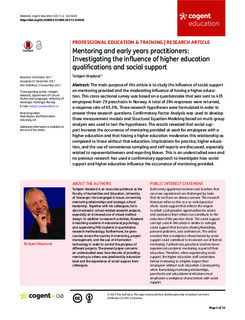Mentoring and early years practitioners: Investigating the influence of higher education qualifications and social support
Journal article, Peer reviewed
Published version
Permanent lenke
http://hdl.handle.net/11250/2491874Utgivelsesdato
2017-12Metadata
Vis full innførselSamlinger
Originalversjon
Waaland, T. (2017) Mentoring and early years practitioners: Investigating the influence of higher education qualifications and social support. Cogent Education. 4 (1), 1-13. 10.1080/2331186X.2017.1415630Sammendrag
The main purpose of this article is to study the influence of social support on mentoring provided and the moderating influence of having a higher education. This cross-sectional survey was based on a questionnaire that was sent to 435 employees from 29 preschools in Norway. A total of 284 responses were returned, a response rate of 65.3%. Three research hypotheses were formulated in order to answer three research questions. Confirmatory Factor Analysis was used to develop three measurement models and Structural Equation Modeling based on multi-group analysis was used to test the hypotheses. The results revealed that social support increase the occurrence of mentoring provided at work for employees with a higher education and that having a higher education moderates this relationship as compared to those without that education. Implications for practice, higher education, and the use of convenience sampling and self-reports are discussed, especially related to representativeness and reporting biases. This is an understudied area and no previous research has used a confirmatory approach to investigate how social support and higher education influence the occurrence of mentoring provided.

